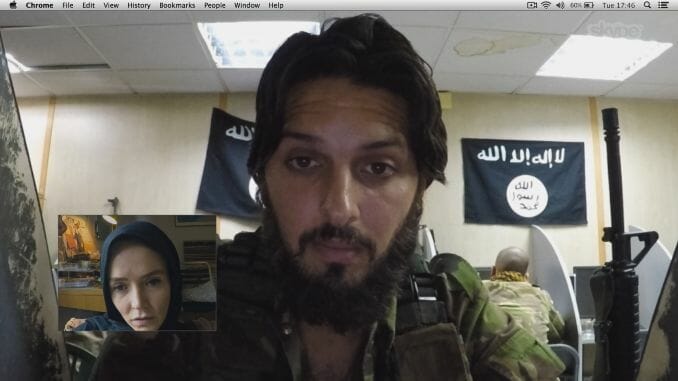Profile‘s Deft Screen Life Format Makes It a Terrifying Glimpse into Internet Facades

Films such as Unfriended, Searching and Host have made the internet a more terrifying place. Ghosts travel instantaneously from computer to computer and dangerous people sneak into your video chats; our technological obsession becomes an object of fear. Now producer, director and screenwriter Timur Bekmambetov, known for his films Nightwatch and Daywatch, is tackling current events in his new film Profile. Bekmambetov has played a crucial role in the growth and development of screen life films, producing both the Unfriended films and Searching. Now, Bekmambetov has finally stepped into the role of director in the subgenre he has helped shape with this nuanced examination of internet identities, isolation (despite constant connection) and extremism.
Amy Whittaker (Valene Kane, who perfectly captures a melding of online identities) is a journalist strapped for cash and desperately trying to nab that next big story in order to secure a paycheck—and maybe even a job. Her desperation leads her to pitch a daring story about the recruitment techniques used by ISIS. Specifically, she’ll pose as a young Muslim convert who wants to go to Syria to join the cause. She creates a fake Facebook profile using the name Melody and begins sharing videos in support of ISIS. Almost too quickly, she meets ISIS recruiter Bilel (Shazad Latif). As their relationship develops, they Skype at all hours: Cooking authentic Syrian dishes, sharing their traumas, and discussing the violence raging in the Syrian civil war and the growth of jihadist organizations. The bond between these two—strengthened by the chemistry between Kane and Laif—begins to grow. Yet, as they get closer, the lines between performance and a potentially real emotional connection begin to blur, and journalistic ethics are violated in the name of a story. There is no one truth about the characters’ own feelings.
In addressing online extremism and the recruitment of young women through Facebook, Profile could easily fall into the trap of portraying Muslims as evil terrorists, always a harmful trope but one that again feels hyper-modern as the headlines are dominated by the current treatment of Palestinians by the Israeli government—religious identity just another element tangled up in colonialist persecution. Films such as The Hurt Locker and American Sniper dedicated themselves to depicting Muslims as murderers of Americans and oppressors of women. While those films directly responded to the Iraq War, this xenophobic trope still pervades film and television today. And Profile does sometimes fall into that borderline exploitation, as Amy plays videos of ISIS members torturing captives. Yet, Bekmambetov ultimately aims to depict the situation with more nuance and complexity in his adaptation of Anna Erelle’s In the Skin of a Jihadist: Young converted women are treated as humans instead of victims and Bilel grows into more than just an ISIS recruiter.
Amy digs into young women’s Facebook profiles, exploring how they’ve changed their names and profile pictures to better reflect their new identities. These women are not just victims of manipulation, but people with their own motivations and desires. Bilel’s own extremism is rooted in his experience with racism in London and his desire for some sort of revenge. Latif’s performance makes the character all the more complex, as his charisma and smile charm the discerning journalist into seeing him as a human being rather than a symbol of evil. Importantly, none of these motivations are glorified or excused. Rather, Bekmambetov (and co-writers Britt Poulton and Olga Kharina) merely aims to provide an honesty to the subject matter while examining the construction of identities over the internet.
More broadly, Profiles examines digital anxiety and how tenuous, performative relationships are formed online. Our social media personas are a fabrication, no matter how much we believe in our own authenticity. Only the best and happiest photos are posted to the feed. We share opinions to appear “woke” or politically plugged-in. Amy’s experience as both herself and as Melody exemplify these digital identity crises. Amy wants to appear like a confident journalist and forms the fake persona of Melody, who is demure, shy and ready to give it all up for Bilel. Then, there is Bilel, who appears sympathetic and kind to Melody/Amy, luring her into a sense of security as she empathizes with his story. But is it authentic? That’s the question. He does have an ultimate end goal, so is he just trying to do his job and perform an act to manipulate Amy? That’s up to the audience to decide.
-

-

-

-

-

-

-

-

-

-

-

-

-

-

-

-

-

-

-

-

-

-

-

-

-

-

-

-

-

-

-

-

-

-

-

-

-

-

-

-








































